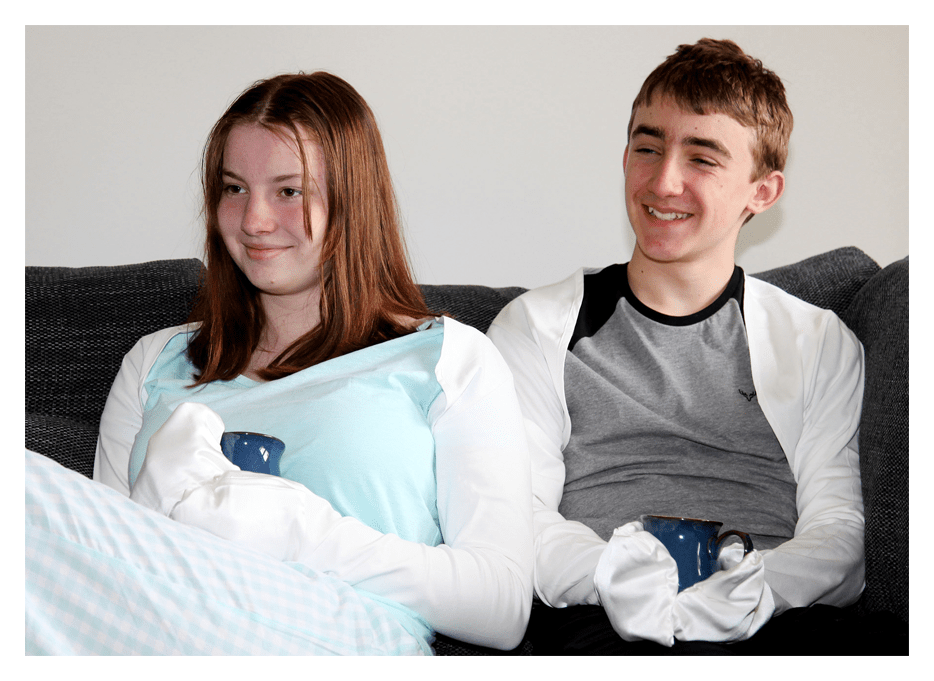Skin Picking in Adults
Skin picking, also known as Excoriation Disorder or dermatillomania, is a body-focused repetitive behaviour characterised by a relentless picking at your own skin.
It is common for skin picking to develop in adults and adolescents who already have other health conditions such as anxiety or Obsessive Compulsive Disorder, as well as in elderly people – especially those who suffer from dementia.
While there are currently very few effective treatments for skin picking, our specially-designed ScratchSleeves can help to break the picking cycle and prevent the resulting skin problems.
What is skin picking?
Skin picking is a common body-focused repetitive behaviour which is estimated to affect as many as 1 in 20 people. People who suffer from skin picking may repeatedly pick, pull, dig, squeeze, or tear at specific areas of their skin, often until the targeted area bleeds, bruises, or shows signs of scarring. The excessive picking can be directed at normal, healthy skin, or targeted towards irregularities such as moles, pimples, scabs, or rashes.
According to OCD UK, dermatillomania is listed in both the International Classification of Diseases (ICD) and the Diagnostic and Statistical Manual of Mental Disorders (DSM) as a sub-category of Obsessive Compulsive and Related Disorders. This is because it often occurs in people who have other psychological symptoms, like depression, anxiety, or dementia.
Like other body-focused repetitive behaviours, Excoriation Disorder typically affects females more than males and can develop at any time from adolescence into adulthood.
How to identify skin picking disorder
Not all people who pick at their skin suffer from Excoriation Disorder. It is common for non-suffering people to occasionally pick at their skin, especially if there are irregularities present such as pimples or scabs. Skin picking is only considered a disorder when it is bad enough to induce further skin conditions or cause significant distress and problems in other areas of life, such as anxiety or avoidance of social interaction.
People who have dermatillomania will either pick at the skin in multiple areas of their body or focus their picking on one location. Some common sites for skin picking include the face, head, cuticles, back, arms, legs, hands, and feet. Usually, individuals will pick with their fingernails. However, some may remove the skin in other ways, like biting or using instruments such as tweezers or scissors.
Someone you know may be suffering from skin picking disorder if they:
- Regularly pick at their skin.
- Involuntarily pick and don’t realise they’re doing it.
- Pick at their skin when feeling stressed or anxious.
- Cause bruises, cuts, scars, or bleeding from skin picking.
- Experience significant psychological, physical, or social impairment resulting from skin picking and it’s resulting visible symptoms.

Causes
The exact causes of skin picking disorder are still unknown, though it is thought that a combination of biological and environmental factors is to blame. However, research shows that dermatillomania commonly develops alongside other mental health conditions including OCD, trichotillomania (a compulsive condition that leads to habitual behaviours such as hair pulling, nail-biting, and teeth grinding), ADHD, and autism.
Skin picking can also arise out of a need to cope with negative emotions like sadness, anger, stress, and tension. However, research by the International OCD Foundation (IOCDF) has demonstrated that some people may pick their skin out of habit or boredom and may even pick without realising they’re doing it.
Skin picking in dementia sufferers
While skin picking affects people in every stage of adulthood, it is extremely common among dementia patients. As we age, our skin tends to get thinner and healing processes slow. This means that there is a greater risk of elderly sufferers experiencing skin infections resulting from skin picking wounds. Although picking is not a symptom of Alzheimer’s Disease or dementia, it is a habit that often develops in people during the middle stages of these conditions when their worlds start to contract and they become more self-centred.
Some forms of progressive dementia can cause tactile hallucinations or delusional thought patterns which could result in behaviour similar to skin picking. So if you know an elderly person who has begun picking at their skin, we advise you to visit a GP to identify and seek treatment for its trigger.
Effects of Skin Picking
People who have experienced Excoriation Disorder often describe a feeling of relief while picking, which is quickly followed by feelings of guilt or shame. Picking can also cause feelings of emotional, physical, and social distress that can interfere with day-to-day social activities, school, and work. Physically, people who have this disorder will experience mild to severe pain after picking, as well as other visible symptoms like sores, scars, and skin infections.
Medical treatments for skin picking
Though finding a definitive treatment treatment pathway for dermatillomania requires further research, there are a variety of suggested medications and therapies that have helped people with Excoriation Disorder, including:
- The prescription of Selective Serotonin Reuptake Inhibitors (SSRIs) and other antidepressants.
- Some research suggests that anti-seizure medicines can be useful if prescribed as treatment.
- Cognitive Behavioural Therapy (CBT) has been suggested as a helpful treatment for skin picking. CBT is a therapy in which a mental health professional will help a person to identify their emotional, physical, and environmental triggers for specific behavioural conditions.
- Acceptance and Commitment Therapy (ACT) is another form of behavioural therapy that has been suggested as a successful method of treatment. ACT combines the practices of mindfulness and self-acceptance to encourage people to embrace their thoughts and feelings instead of feeling ashamed of them.
Other things you can do
There are a variety of measures you can take to help prevent skin picking. These include:
- Keep busy – engage in positive and meaningful activities that keep your hands and mind busy. This will distract you from feeling the desire to pick at your skin.
- Fidget toys can be great tools to prevent mindless picking. A fidget toy can be anything from a rubber ball to a Rubik’s cube.
- Wear clothing that covers the area you usually pick at. This will act as a barrier to prevent picking. If you suffer from Excoriation Disorder or are caring for someone who does, make sure you carefully consider the material of their clothes. Sticking to eczema-friendly fabrics, like silk and cotton, and avoiding wool or other rough fabrics, can help to prevent itching and therefore lessen the tendency to pick at skin, rashes, or spots.
- Wear gloves or eczema mitts that will gently restrain your hands (especially when watching TV or sleeping). This will stop you from being able to pick at your skin, allowing the affected areas to heal without being disturbed. ScratchSleeves are designed specifically to minimise the dame done by skin-picking and scratching.
- Keep skin moisturised, hydrated, and clean to avoid any spots or eczema outbreaks that could encourage picking. Keeping skin clean also helps to prevent skin infections if there are open wounds.
- Keep nails short. Having short nails means if you do begin to subconsciously pick at your skin, you are less likely to cause open wounds or transmit bacteria beneath the skin’s surface.
If you believe that you, or someone you know, may have dermatillomania, we advise you to visit your GP or dermatologist for an official diagnosis. You can find out more about skin picking at iocdf.org or seek treatment at stoppicking.com.

Quick buy



